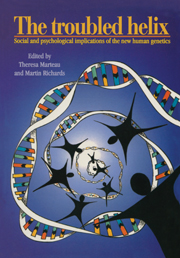1 - Daily life and the new genetics: some personal stories
from Part I - Personal stories
Published online by Cambridge University Press: 01 June 2011
Summary
Introduction Martin Richards
This section presents the voices of family members whose lives have been deeply touched by genetic disease. It seems entirely appropriate that this should be the starting point of our analysis of the social and psychological consequences of the new genetics. These are people who carry the burden of genetic disorder and it is in their name that the whole clinical enterprise of the new genetics has been mounted. But we hear too little of their views: much more often it is the clinicians and researchers who tell how they think the lives of such people will be affected. In this section of the book we put those directly affected first and let a clinician have an afterword at the end.
A series of personal accounts such as these cannot be said to be representative of all those who come from families with genetic disorders. But, of course, neither can quantitative studies that set out to assess the experiences of a group of people in terms of means and median of a group. Such approaches conceal the diversity of response. There is a great deal of individuality, personal history and accident in the ways in which genetic disorder is experienced.
In planning this section we first selected a number of genetic disorders that varied in their features. Huntington's disease was chosen because it develops late in life and predictive testing is now available.
- Type
- Chapter
- Information
- The Troubled HelixSocial and Psychological Implications of the New Human Genetics, pp. 3 - 60Publisher: Cambridge University PressPrint publication year: 1996
- 2
- Cited by



